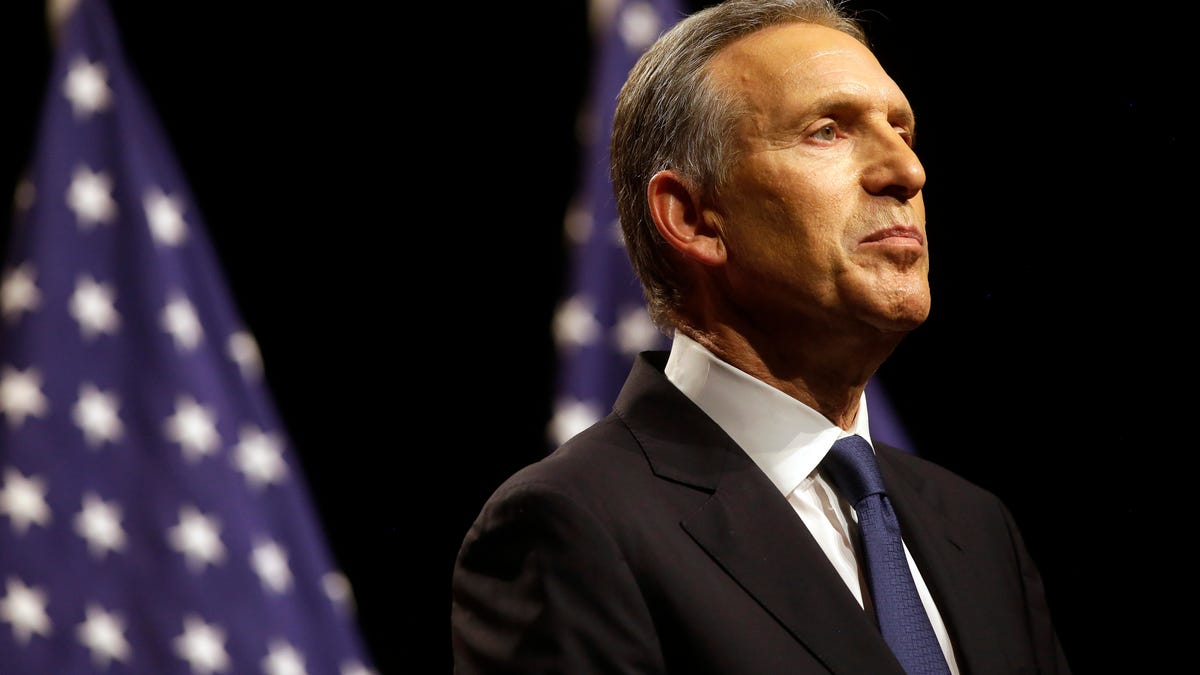Twitter suspends accounts in Howard Schultz disinformation effort
Two days after suspending the fake "Women_4_Schultz" account, the social network takes action against three accounts spreading disinformation about the former Starbucks CEO.

Former Starbucks CEO Howard Schultz is considering running as an independent presidential candidate in the 2020 election.
It's time to wake up and smell the coffee.
Since late January, Twitter has suspended several accounts that pretend to support Howard Schultz's political ambitions but are actually pushing other agendas. On Thursday, Twitter suspended three more accounts for violating its policies.
Schultz hasn't officially announced he's running for president, but the businessman has said he's considering an independent run for the White House. Since his announcement in late January, several accounts pretending to support the former coffee shop executive have popped up on Twitter.
On Thursday, Twitter suspended the accounts @GaysForSchultz, @PresSchultz2020, and @HowardJSchultz. The @HowardJSchultz account described itself as "Millennials for Schultz." Before they were suspended, all three accounts were posting content from the "alt-right," a loosely knit movement of white nationalists and neo-Nazis.
The @GaysForSchultz account responded to tweets about Ruth Bader Ginsburg conspiracy theories, while the @PresSchultz2020 account posted anti-Muslim content alongside posts supporting Schultz's presidential ambitions.
The three accounts violated Twitter's "Fake Accounts" policy, according to a person familiar with the suspensions. While parody accounts of Schultz are still on Twitter, these three accounts were considered "fake and misleading."
Schultz didn't immediately respond to a request for comment.
One of the suspended accounts.
Creating fake social-media profiles tied to politics isn't new. During the 2016 US presidential election, Russian operatives made fan pages on Facebook and accounts on Twitter supporting third-party candidates, such as Jill Stein, with the intention of pulling votes away from Hillary Clinton, the Democratic candidate.
In late January, Twitter suspended the accounts @Blacks4Schultz and @GOP4Schultz, the former for operating multiple accounts. The @Blacks4Schultz account had a stock-photo image of an African-American man with "Howard" edited onto his shirt.
The most prominent account was "@Women_4_Schultz," an account created by Jacob Wohl, a conservative activist who bragged to USA Today about his plans to create fraudulent Twitter profiles and promote candidates considered less likely to defeat President Donald Trump in the 2020 presidential election.
Wohl's fake accounts, along with his own Twitter profile, were suspended last week for violating the social network's policies, "specifically creating and operating fake accounts," a Twitter representative said.
The strategy was taken right out of Russia's disinformation playbook, by setting up fake accounts to allege support for candidates who have a weaker shot at the White House, Ben Nimmo, a senior fellow at the Atlantic Council's digital forensic research lab, said.
The other suspended Schultz accounts aren't tied to Wohl, according to a person familiar with the situation.
Some accounts pretending to support Schultz are still active on Twitter. The social network allows parody profiles as long as they don't violate Twitter's rules.
That could be why Wohl's @Women_4_Schultz account was suspended while @WomenForSchultz, a parody of former Trump attorney Michael Cohen's "Women for Cohen" account, still remains.
Social networks are gearing up for a flood of disinformation as the 2020 US presidential election draws closer.
It proved to be an effective tool for Russian operatives in 2016, and US intelligence officials now consider disinformation a global threat.
The slow drip of Schultz accounts getting suspended is just a small example of the flood of disinformation social networks are expecting over the next year.
"One of the main worries after the Russian operation was exposed was that users in America would copy it," Nimmo said. "We've already seen reported attempts in the Alabama special Senate election, targeting potential Republican voters. Now it looks like we're seeing similar activity targeting Democrats. It's a bad sign before 2020."
Originally published on Feb. 28.
Update, March 4 at 7:04 a.m.: To add details on why these accounts were suspended.

